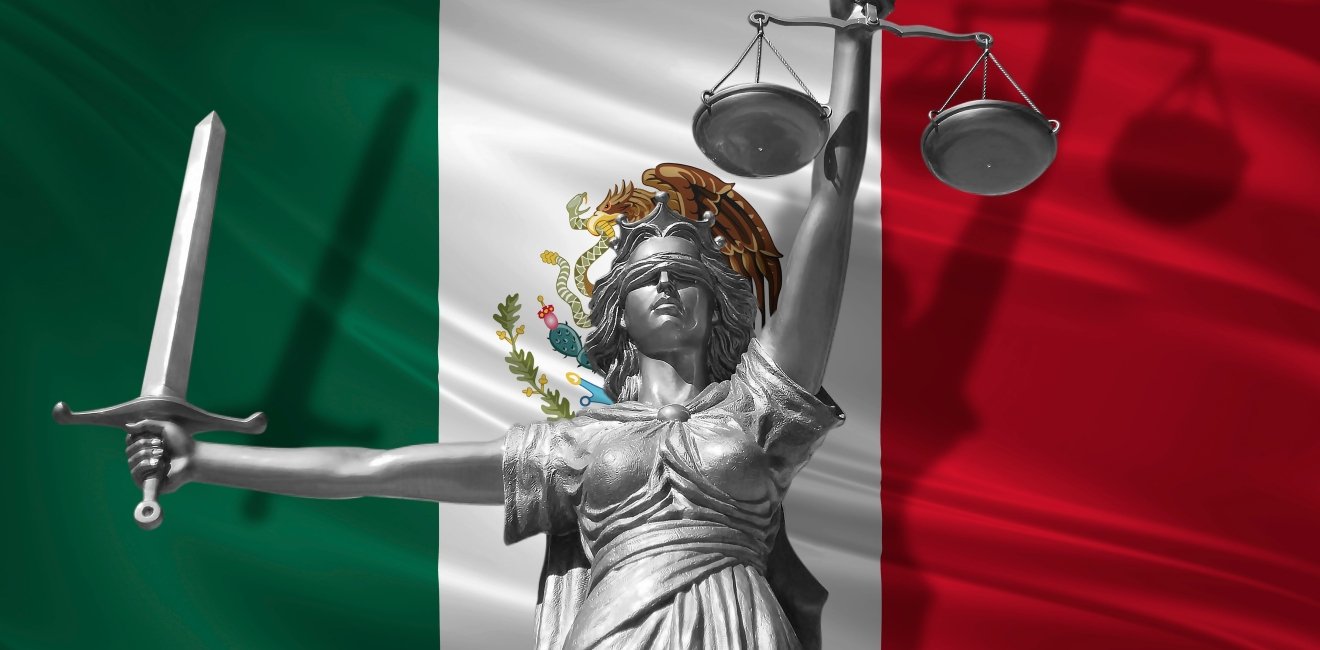
"The devil is in the details." The recent judicial reform introduces the concept of faceless judges, as outlined in Article 20, Section A, Subsection X of the Mexican Constitution. This amendment, which establishes anonymous judges, was proposed by former President López Obrador during his morning briefing on August 20. However, it was later discussed in Congress without comprehensive review, justified by the need to protect judges' lives in cases related to organized crime.
Judges dealing with organized crime cases encounter significant risks, yet this approach does not address those issues. Furthermore, it undermines the rule of law and impacts Mexico's relations with the United States and other countries.
The effectiveness of this measure is paradoxical; it aims to conceal judges' identities while simultaneously promoting reforms that increase their public visibility through popular elections.
In reviewing the Peruvian experience, the United Nations´ Special Rapporteur on the independence of judges and lawyers observed that judges and prosecutors who were supposed to benefit from anonymity did not feel secure within the system. They noted that it was relatively easy to uncover their identities. Furthermore, the Rapporteur indicated that there are less intrusive ways to protect judges without undermining due process (E/CN.4/1998/39/Add.1, para. 74.). For instance, enhancing protection measures for judges—an obligation already assigned to the Federal Judiciary Council (CJF)—could be more effective. Additionally, the public exposure of judges at government “mañaneras” should be reconsidered to mitigate unnecessary risks.
However, past experiences have shown the complications this approach generates. For example, during Peru's counter-terrorism efforts, faceless judges under the Fujimori administration led to human rights abuses and compromised judicial guarantees.
The Inter-American Commission on Human Rights (IACHR) criticized the "secret" justice system for flagrantly violating the due process guarantee of being tried by an independent and impartial judge or tribunal and the right to a public trial. It also complicated the recusing of judges since their identities were concealed (OEA/Ser.L/V/II.106, Doc. 59 rev., para. 103). In this context, the Commission has stated since 1993 that because the identities of those involved are unknown, nothing can be said about their impartiality and independence (OEA/Ser.L/V/II.83 Doc. 31, para. 64.)
Issues related to access to evidence, law enforcement interrogations, hooding defenders, and difficulties accessing case files were also highlighted. (E/CN.4/1998/39/Add.1, para. 72-74.)
The UN Human Rights Committee condemned the lack of access to judges’ identities and the denial of the right to a public trial (Supplement No. 40 A/51/40, para. 350). Indeed, in any judicial process, knowing who presides over your case and understanding potential biases or conflicts is fundamental to ensuring fairness. The anonymity of judges undermines individuals’ rights to a fair trial by preventing them from challenging the judge’s impartiality (OEA/Ser.L/V/II.106, Doc. 59 rev, para.104).
Ultimately, the Inter-American Court of Human Rights determined that this figure is incompatible with the American Convention on Human Rights. In several cases involving Peru, it affirmed that trials held before "faceless" or identity-concealed judges violate every individual's right to be tried by a competent, independent, and impartial tribunal. The reason is that such anonymity prevents defendants from knowing who is judging their case, thus hindering their ability to determine grounds for recusal and mount a proper defense.[1]
The situation in El Salvador is more recent. There, faceless judges operating under a state of emergency have compromised due process, resulting in increased incarceration rates, diminished judicial transparency, and heightened executive power consolidation. In this regard, the IACHR has called for abolishing this judicial practice (OEA/Ser.L/V/II Doc. 97/24, para. 124-126 & recommendation 7).
Consequently, secrecy breeds a lack of transparency, jeopardizes judicial impartiality, and hinders individuals' ability to defend themselves effectively. Moreover, it prevents verification of judges' qualifications or suitability, undermining social control over their actions and increasing the risk of corruption. The concealed identities of judges contradict the principle of transparency inherent in Mexico's adversarial criminal system, leaving unanswered questions about how this will be implemented.
Thus, it has been argued that introducing this figure could fundamentally compromise all criminal proceedings where it is utilized, given Mexico's extensive legal framework regarding organized crime. Additionally, it could promote opacity within the justice system.
However, its implementation may also have unintended consequences for relations with the United States. The preamble of the United States–Mexico–Canada Agreement (USMCA) emphasizes that the treaty aims to promote the rule of law.
Judicial independence is crucial for safeguarding human rights, democracy, and the rule of law—an essential framework for their operation. In democratic societies, these principles ensure equality before the law, peace, security, and development (A/HRC/35/31, para. 14-15). However, without judicial independence, these foundational elements are weakened. If faceless judges undermine these values, they also negatively impact the rule of law.
The USMCA also addresses anti-corruption initiatives. It's reasonable to presume that faceless judges could exacerbate corruption in Mexico, manipulate judicial outcomes, and diminish trust in the justice system.
In the United States, due process—including the right to know a judge's identity—is fundamental. Any threats to due process or human rights are viewed as significant setbacks for Mexico’s judicial framework, likely influencing perceptions of the rule of law and generating criticism regarding transparency and institutional integrity.
Historically, both nations have collaborated on security matters and combating organized crime. While faceless judges might be perceived as an initiative aimed at addressing violence and protecting judges—thus appearing beneficial for Mexico’s judiciary—they may also be interpreted as a desperate measure reflecting an inability to guarantee safety. This approach seems more like a simplistic response rather than a comprehensive solution.
A relevant example of how this issue impacts bilateral relations is the area of extradition and international cooperation. If the United States perceives that anonymous judges undermine due process, judicial transparency, and the integrity of Mexico’s judicial system, it may adopt a more cautious approach. This could result in a reluctance to collaborate on joint initiatives to address organized crime.
The lack of comprehensive debate surrounding faceless judges fosters distrust—especially as this measure is linked to other controversial constitutional reforms like militarizing the National Guard and expanding crimes subject to automatic pre-trial detention —actions that contradict recent rulings by the IACHR Court in the cases of Tzompaxtle Tecpile and Garcia Rodriguez et al.
International experiences suggest that faceless judges do not enhance security or strengthen judicial systems but can facilitate abuses and violations of human rights. While organized crime presents a severe challenge, state responses should not infringe upon fundamental rights. Instead, priority should be given to strengthening protective mechanisms and implementing security protocols that ensure justice while maintaining transparency. Justice may be blind, but it must always have a face.
[1] Cases J. v. Perú, para 184; Castillo Petruzzi et al. v. Peru, para. 133-134; Cantoral Benavides v. Peru, para. 127-128; De la Cruz Flores v. Peru, para. 114; Lori Berenson Mejía v. Peru, para. 147; and Garcia Asto y Ramirez Rojas v. Peru, para. 149.
Author

Explore More
Browse Insights & Analysis
Distinguished Fellow Carrie Filipetti provides an update on developments in Venezuela

Insights: Ambassador (ret.) Philip Reeker – Europe & the U.S. National Security Strategy

Distinguished Fellow Ambassador David Hale provides analysis on Iran
